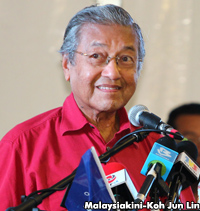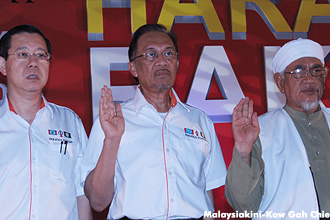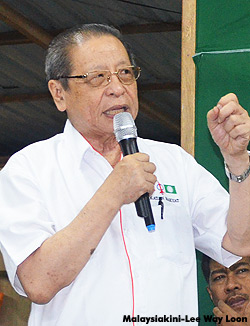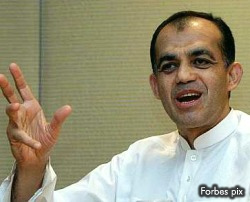Manifestos aside, know this - Neither Pakatan Rakyat, nor BN leaders will be so lucky as to get a clean page to rewrite government the way they dream about, even if they get voted in with a strong majority in Parliament.
 Apart from inheriting hundreds of years of British rule, and before that a collection of sultanate states, Malaysia now has 30-odd years of ‘Mahathirism’ to work through as well, along with competing corporate interests and a ticking clock on Vision 2020 to make Malaysia a developed nation in seven years’ time.
Apart from inheriting hundreds of years of British rule, and before that a collection of sultanate states, Malaysia now has 30-odd years of ‘Mahathirism’ to work through as well, along with competing corporate interests and a ticking clock on Vision 2020 to make Malaysia a developed nation in seven years’ time.
There is much historical baggage and past governments’ mistakes to address, not the least of which is a somewhat bloated ruling machinery with lots of government-linked companies (GLC) extending, some would argue invading, into the private business sector.
How will a Pakatan or a renewed BN mandate restructure Putrajaya-driven fiscal policy which is now characterised by an institution of basic food and fuel subsidies, rent-seeking behaviour and unstable tax collections and oil revenues?
Instituted by his father Abdul Razak Hussein, who was the former prime minister in 1970-1976, Najib himself is a product of the New Economic Policy (NEP). After 38 years, the NEP was scrapped and replaced by Najib in 2009 with the New Economic Model (NEM). However, critics have said that NEP has failed to achieve one of its stated aims, which is to raise the participation of Malays in the economy to 30 percent.
 The Pakatan manifesto’s biggest changeover is that it promises to be the first Malaysian government to strive for a race-neutral economic policy. In a marked departure from the past, the BN manifesto says it is also chasing the same middle ground.
The Pakatan manifesto’s biggest changeover is that it promises to be the first Malaysian government to strive for a race-neutral economic policy. In a marked departure from the past, the BN manifesto says it is also chasing the same middle ground.
“We believe in social justice, and being inclusive, touching and improving the lives of all Malaysians irrespective of race or religion,” the BN manifesto notes. Najib himself has actively built bridges with Chinese and Indian communities.
But the fact remains - BN’s main component parties are still organised around racial and ethnic lines. Pakatan’s three parties can boast of having members from all three major races in Malaysia. They also have an almost equal share of parliamentary seats compared to Umno’s dominance within BN.
Looking back at Najib’s economic track record of the last four years, it would also be very hard to argue that he has truly broken free from the previous BN administration’s shadow. The BN system has long been associated with rent-seeking behaviour by companies eager to obtain cheap land for development and easy to do, high-return projects. BN’s manifesto sadly disappoints for not spelling out any marked departure from the old ways.
 The BN manifesto simply reads like a long menu list of hospitals, schools, expressways and road projects, high speed railways, urban development, places of worship, houses, and infrastructure upgrades to be erected - all projects made to order.
The BN manifesto simply reads like a long menu list of hospitals, schools, expressways and road projects, high speed railways, urban development, places of worship, houses, and infrastructure upgrades to be erected - all projects made to order.
“The NEP is very much in force; not officially, but its principles are still enforced in the ministries and state governments,” DAP supremo Lim Kit Siang ( left ) recently blogged.
Under Najib’s NEM, Government Transformation Programme (GTP) and Economic Transformation Programme (ETP), government-linked agencies such as Permodalan Nasional Berhad, Petronas, Khazanah Holdings - and recently, 1Malaysia Development Bhd (1MDB) which reports to the Prime Minister’s Office or the Finance Ministry - drive much of Malaysia’s top companies with their web of stakeholdings.
No doubt, power is concentrated in the position of the prime minister.
“Unlike her neighbours in Asia and beyond, Malaysia has gone the other way, consistently centralising revenue sources and responsibilities,” wrote Francis Hutchinson, a research fellow at Singapore-based think-tank Institute of Southeast Asian Studies (ISEAS) in a study on Malaysia.
Federal-controlled Kuala Lumpur has been the epicentre of Malaysian development since independence in 1957. Since then, Malaysia has produced 14 billionaires, according to Forbes magazine.
 The most prominent billionaire, bumiputera entrepreneur Syed Mokhtar Al-Bukhary (
right
), is now seen as the Malaysian government’s preferred business partner. He owns everything from rice to sugar, post offices to defence, and the car business. His every move makes headlines and Syed Mokhtar was last seen eyeing the national airline, no less.
The most prominent billionaire, bumiputera entrepreneur Syed Mokhtar Al-Bukhary (
right
), is now seen as the Malaysian government’s preferred business partner. He owns everything from rice to sugar, post offices to defence, and the car business. His every move makes headlines and Syed Mokhtar was last seen eyeing the national airline, no less.
In contrast, Pakatan’s manifesto says it will abolish monopolies and wants open tenders for all procurements in public entities.
“Monopolies are an encumbrance to economic growth and discourage competition. Pakatan Rakyat’s economic policy will focus on breaking up monopolies,” the Pakatan manifesto notes.
Meanwhile, BN’s manifesto does not even mention monopolies.
Go to KiniBiz for more .

